New Pope Who Dis?
What we (mostly don't) know about Pope Leo XIV
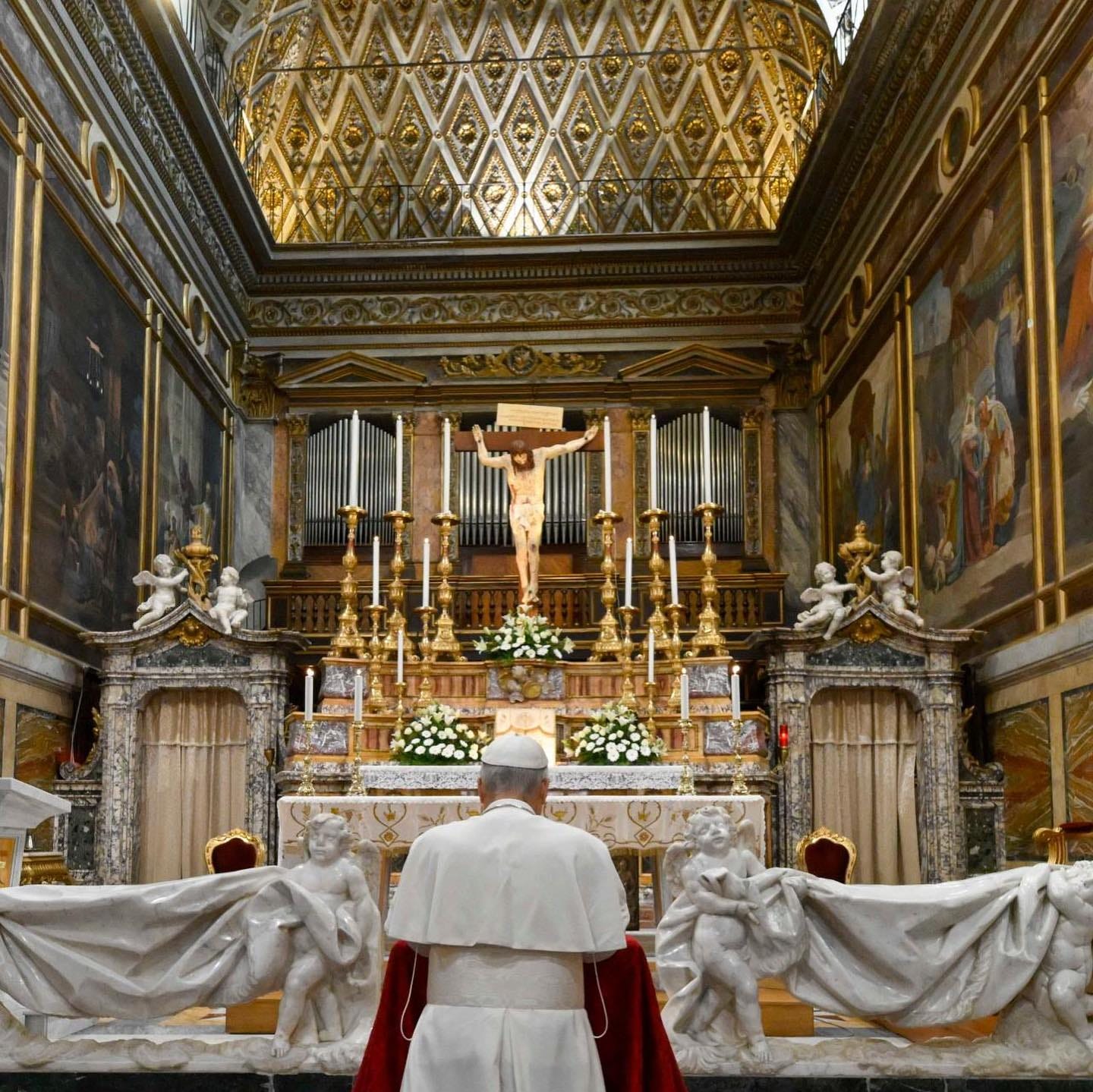
Habemus papam! So who is he?
Everyone wants to know how Pope Leo XIV thinks and what he’s going to do. Upon his election, we all1 opened up the College of Cardinals Report to see Where He Stands on “The Issues.” Leaving aside the question of whether issue-based analysis is a healthy way to engage with a pastor in the first place, we were greeted by a whole lot of question marks:
Pope Leo’s position on making priestly celibacy optional? Unknown.
Pope Leo’s position on the Tridentine Latin Mass? Unknown.
How about the Vatican’s highly controversial, and secret, concordat with the Chinese Communist Party? This is such a big deal that Cardinal Parolin’s role in crafting the accords led Cardinal Zen to go kamikaze on his candidacy, and probably sank it. Pope Leo’s position? Unknown.
How about the most embittered doctrinal fight of the Francis papacy: can committed, continuing adulterers receive communion under some circumstances? This question (known as the Amoris Laetitia controversy) went to the heart of Catholic teaching on marriage, because many Catholic adulterers consider themselves remarried, thus not adulterous, despite Jesus’s words. It also went to the heart of Catholic teaching authority, since the Church had faced the question before, and answered with a fairly resounding “no.”2 Just how much could this doctrine develop? How much of the prior teaching was infallible, and how could the new teaching be squared with it? If the pope purported to develop the doctrine beyond what the Church allowed, did that mean we had a heretic pope? If the pope was not a heretic, why wouldn’t he just freaking answer the dubia? What are the consequences of a debatably heretical pope, a crisis the Church had not faced since Pope Honorius in 638? What are Pope Leo’s views on any or all these difficult questions? Unknown.3
How about Germany’s “Synodal Way,” a reform process that the German bishops have continued despite grave doctrinal concerns, clear and consistent opposition from Pope Francis, and a growing risk of schism? Pope Leo’s views are Unknown.
What is Pope Leo’s position on blessings for same-sex couples, something Pope Francis rolled out and then had to partially walk back in the face of strenuous opposition from the Church in Africa? Pope Leo followed the party line: there’s room for a certain kind of blessing of same-sex couples (my canon lawyer friend Daniel Quinan has argued this is correct), drawing many technical distinctions, but its appropriateness is culture- and context-specific. In short: Mixed.
How about artificial contraception? The Church’s ancient teaching against artificial contraception crystallized in 1968’s Humanae Vitae, provoking a lay rebellion (supported by progressive clerics) that has, more or less, continued unabated for 60 years.4 The teaching against contraception lies right at the heart of the Church’s teaching on human sexuality, so it will remain the flash point in intra-Catholic fights about sex for as long as the Church’s sexual teachings remain controversial.5 Pope Leo’s view? Unknown.
These are the most salient issues separating the Church’s conservative faction from its progressive faction,6 and we know how Pope Leo stands on roughly none of them. In other words, this guy’s a blank slate.
With so many high-stakes questions seemingly up in the air, everyone7 is claiming Pope Leo as their own. My social media feeds are full of (well-founded) anxiety masquerading as investigation. Everyone’s analyzing everything they can get their hands on, which right now amounts to like two decent homilies and a banal address to the cardinals. In fact, we are so desperate for understanding that quite a lot of what’s circulating among Catholics right now is unfounded or outright fabricated.
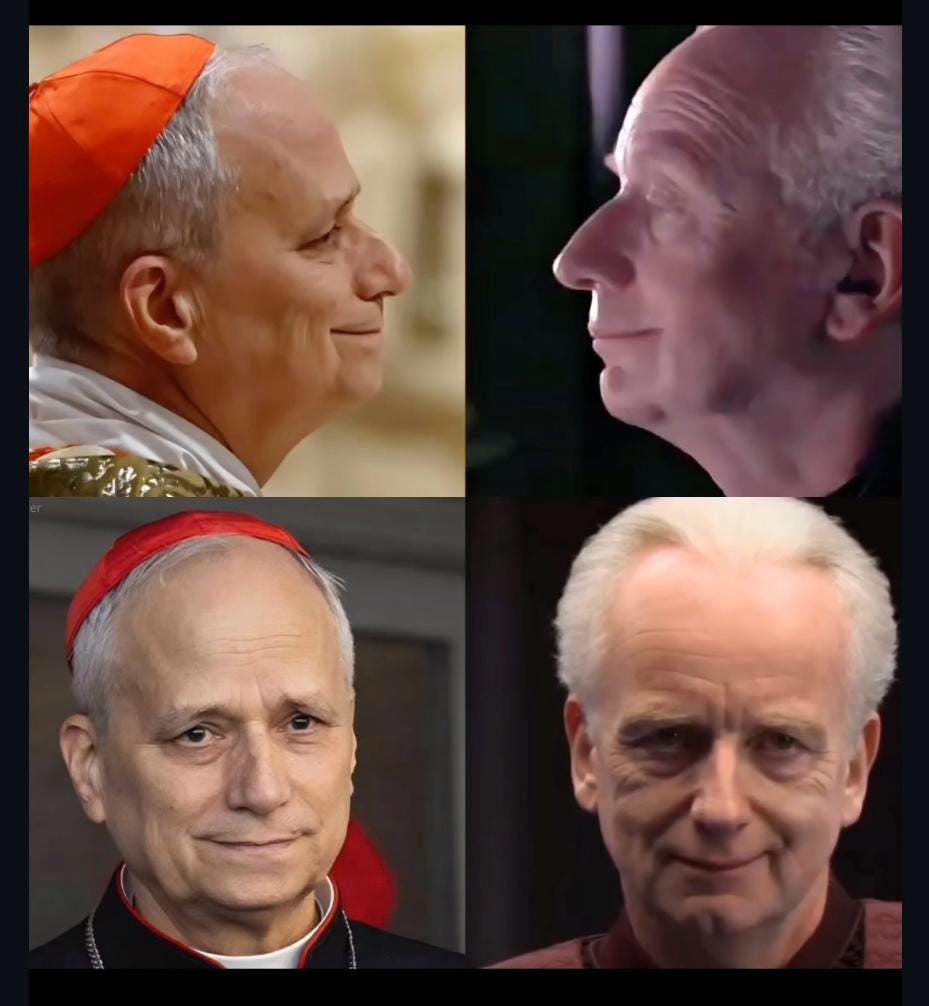
Unfounded Leonine Claims
You may have seen this quotation in circulation: “We cannot build a just society if we discard the weakest—whether the child in the womb or the elderly in their frailty—for they are both gifts of God.”
This is a great line. I’ve seen it cross my Facebook feed probably five times next to a big picture of Pope Leo. Unfortunately, Pope Leo never said it.
Hours after the election, prominent, credible, and generally excellent pro-lifer Charlie Camosy asked the Grok LLM for Pope Leo’s record on abortion, and Grok hallucinated a pack of pro-life-sounding quotes, including this one. Camosy, not realizing they were hallucinatory, not yet wise enough in the ways of LLMs to double-check, reposted the quotations uncritically. Within a few hours, he realized his mistake and deleted the tweet, but it was too late. Camosy is important enough, and excitement about Leo high enough, that his quotes had already been picked up by LifeNews, from which they rapidly spread to a million million theologically conservative quote mill accounts, beyond hope of correction.
Similarly, I have also been unable to find any credible verification of the popular claim that Pope Leo co-founded pro-life student group Villanovans for Life in 1974. I have confirmed that the group formed in 1974 (barely a year after Roe v. Wade!), when Leo would have been a freshman or sophomore, so this is very plausible, but it is unconfirmed and probably should not be shared. If anyone can find a 1974 copy of Belle Air, the Villanova yearbook, it might contain the proof.
Claims that Leo is a registered Republican voter are also wrong, but with a grain of truth. Illinois does not have partisan voter registration, so there’s no such thing as a “registered Republican.” Instead, a voter can choose which party’s primary to vote in at each election. (My home state of Minnesota uses the same system.) Pope Leo voted in the 2012, 2014, and 2016 Republican primaries (and in no primaries since). He also voted in the Democratic primaries in 2008 and 2010, though, so does this really tell us anything?
Some of the biggest excitement has surrounded allegations that Pope Leo has routinely celebrated the Tridentine Latin Mass. Many liturgical progressives have tried to stamp out the TLM, even though TLM parishes are thriving. Most notable among the TLM-haters was Pope Francis, who wrote a law called Traditiones Custodes that restricted it to the point of suffocation.8 However, rumor has it that Pope Leo sees it differently. One anonymous source even claims that Pope Leo sought and received an indult to say the TLM at the headquarters of the U.S. Council of Catholic Bishops in the 1980s. If you know anything about the USCCB in the mid-’80s, you know that it would have been courageous of Fr. Prevost even to request the indult, and astounding for him to receive it.
I suspect that at least some of these claims are true, but I also suspect they are missing some vital context. In any event, no version of this story has been confirmed. The closest thing we have is Damian Thompson’s tepid confirmation (since questioned). The closest thing I have is that I have a friend who knows a guy who says he knows several clerics who claim they witnessed Pope Leo perform the TLM at times in the past. That’s fairly credible to me (>70% likelihood of being true), but it’s not enough to shed much light on what Pope Leo will do with the TLM in office.
How He Won
Thanks to cardinals violating their solemn oaths of secrecy with a frequency and brazenness that startled even cynical me,9 we know a great deal about how Cardinal Prevost was elected pope.
“+Bob” didn’t start out the sede vacante looking like anything special. I have heard that his speech at the pre-conclave general congregations was a tolerable dime-a-dozen snoozefest, not the work of someone expecting or hoping to be in contention. However, Cardinal Prevost eventually turned out to be a satisfactory compromise between progressive and conservative cardinals in North and South America. He appears to have been backed by both progressive (scandal-ridden) +Maradiaga and conservative (unnervingly-affable) +Dolan, uniting both progressive and conservative factions in both North and South America.10
The cardinals must have dismissed the allegations that +Prevost mishandled sex abusers as unfounded. I trust the college of cardinals’ judgment on abuse allegations about as much as I trust the Ministry of Magic’s judgment on whether Voldemort has returned. In fairness, there is some reason to believe the cardinals were right to doubt the allegations. In any case, +Prevost clearly beat the rap.
With both Americas behind +Prevost as a bloc, he was well-positioned to capitalize when Cardinal Parolin’s candidacy inevitably collapsed on a disappointing first ballot. It had long been clear that the only way +Parolin could become pope would be if the conservative and progressive factions (neither of which liked or trusted +Parolin) were unable to identify another mutually acceptable candidate (or unwilling to take a risk on a less-known quantity). Although this conclave had a lot of unconnected newbies, it was never very likely they would be that disorganized, which is why my betting guide gave +Parolin only a 15% chance at victory.
Sure enough, +Parolin had a poor first ballot. To be elected pope required 89 of 133 votes. A simple majority of the conclave (which is often seen as a point of no return for a growing candidate) was 67 votes. +Parolin’s camp had been claiming two weeks before that they could get at least 50 votes on the first ballot, a pole position that would make it hard for anyone else to stay in contention. That didn’t happen. +Parolin’s first-ballot total appears to have been in the low 40s.
That poor performance cleared a path for rival candidates. Italy was divided between +Parolin, +Zuppi, +Pizzaballa, and, apparently, +Betori. As one anonymous Vatican diplomat quipped of the Italians, “If you have four candidates and the Americans have one, you lose.” European progressives were apparently unable to get on the same page with Asian progressives (who backed +Tagle) or pick up enough African votes (Africa is conservative), so ended up splitting their insufficient votes between the cardinals already mentioned, plus +Grech, +Aveline, +David, and +de Mendonça.
Conservatives, surprisingly, reportedly split between +Erdő (who was often described pre-conclave as having monolithic conservative backing), +Sarah (who never had a prayer), +Pizzaballa, and +Ranjith. The Register reports that conservatives began to solidify behind +Ranjith rather than +Erdő, but it soon became clear (as always seemed likely) that conservatives did not have the votes to elect a conservative, only the votes to block an unacceptable progressive. Their support then flowed to the compromise lane.
I’m sure there were others in the compromise lane besides +Prevost (perhaps +Mamberti and surely +Pizzaballa), but +Prevost had by this point locked up cross-factional support from both Americas. On the very, very rare occasion that all factions in both Americas can agree on anything, we’re actually quite a big voting bloc, with 37 cardinals! On the second ballot, +Prevost clarified his position as the leading compromise candidate while +Parolin stalled out. On the third, +Parolin lost votes while +Prevost secured a near-majority. At this point, it became clear he would be the next pope. (If you’ve seen Conclave, this was the position of fictional Cardinal Adeyami just before his scandal was revealed.)
Once a candidate reaches this threshold, the opposition tends to lose heart. In our mass media age, there is also a common (if stupid) concern among the cardinals that dragging out the conclave will damage the Church by sending the (true) message that the Church has deep and important divisions. On ballot four, then, the cardinals followed tradition11 by awarding Cardinal Prevost more than 75% of the vote in a show of unity which, I guess, many of them were already planning to sinfully leak to the press!
How We Missed Him
The biggest shock to me in this election was that our betting pool missed him. We had bets on sixteen different cardinals (and one layman). Thirteen of them were in the Top 20 papabili. We had our net stretched out nicely!
I remember, when the white smoke went up, I said to myself, “Okay, as long as it’s not +Prevost or +Mamberti, we’ve got this.”
But I was mistaken! Someone actually did bet on +Mamberti at the eleventh hour!
Yet Prevost evaded us.
(Note to bettor Paloma R.: the +Mamberti bet was smart money. I also thought Teresa C. made a smart late bet on +Eijk.)
There should now be an argument about whether +Prevost was properly considered papabili or not. Many people were surprised when he stepped out on the loggia, but should we have been?12
There’s a good case in favor of surprise. After all, Cardinal Prevost did not even appear in my betting guide! I said:
Under ordinary circumstances, then, I would say there’s a 95% chance that the winner will be one of the 20 papabile listed today on CollegeOfCardinalsReport.com, an 80% chance it will be one of the Top 10 contenders, and a 50% chance it will be one of the Top 2 (Parolin or Tagle).
Circumstances were not ordinary, so I tamped those odds down considerably in my final analysis… but I still thought there was well over an 80% chance that the new Holy Father would be on the College of Cardinals Report’s papabile list. Cardinal Prevost was not on that list. (They eventually added him to their list, but not until sometime after May 2, and possibly not until after the election.) Nor was +Prevost on any of the other papabili lists published prior to my betting guide, at least none that I saw.
However, I think the “not a surprise” side has the better argument. We should not have been surprised by +Prevost. He emerged late, just after I published my betting guide, but, when he emerged as papabile, he did so decisively.
The Pillar’s Smoke Signals feature began discussing +Prevost (below the paywall) as a candidate being offered up by a progressive camp that wanted to stop +Parolin but didn’t have the votes for their preferred +Tagle, +Zuppi, or +Aveline. This was when we learned of +Prevost’s backing from +Maradiaga, which was a huge turn-off for me. (+Dolan’s apparent role as conservative kingmaker was not recognized until after the conclave.) The seriousness of +Prevost’s candidacy was confirmed over the weekend, when both The Pillar and Crux suddenly rolled out features on him. The Pillar even reported that he was expected to finish in third- or fourth-place on the first ballot. (This appears to have been correct!) However, his candidacy was swiftly tested when The Pillar re-raised concerns about his record on abuse.
That’s why I missed him.
I had been thinking about updating my betting guide with information about +Prevost, but the abuse story convinced me not to. I knew his odds were now much higher than the implicit 0.02% chance I’d given him and all the other backbench cardinals. Indeed, I knew he was more likely than some of the official papabile by that point. However, I assumed that even the whiff of a possibility of connection to the abuse scandal would doom him. I also did not realize he had conservative backing, so I thought he was just another progressive trial balloon in the +Aveline/+Grech/+Tagle lane. I therefore decided +Prevost’s emergence as a minor candidate was not sufficient reason to post an update, even as I discussed his better-than-expected prospects on social media.13
Whoopsie-diddle.
I gotta take the L on this one. I confidently predicted that the Pope would be one of the 20 original papabile. I discounted the possibility that new papabile would emerge in the final week of the pre-conclave discussions, after my betting pool started but before the doors of the Sistine shut. This was an error. I compounded it by failing to post an update after my mistake had become clear.
On the other hand, it would be a mistake to overreact to this error, as I think Nate Silver did in his post-mortem:
Plenty of people did predict the American pope, or at least recognized his strong chances. If you were reading The Pillar,14 you weren’t surprised by this outcome. The problem was not that the prediction markets used poor models (although they did), or that markets will never be good at papal elections because the elections are just too infrequent.
Bettors simply weren’t plugged into good information, even though that information was public, much of it was free, the rest was cheap, and the source was highly legible with a solid reputation. This was a research problem, not a modeling problem. It’s fixed by bettors at the next conclave reading Catholic news sources instead of the Washington Post, which thinks “Hallejulah” is Latin. If they don’t, we can help correct the markets ourselves—and make a good profit off their dumb money in the process!
The American Pope?
In the United States, there’s been much speculation that the conclave elected Leo as a rebuke to President Donald Trump. Before his election, Cardinal Prevost was critical of the Trump Administration, with good reason. However, it strikes me as vanishingly unlikely that the conclave considered this at all. There are two reasons for this.
First, I don’t think the conclave considered Leo an American cardinal. After all, they elected him! The college of cardinals, taken as a whole, does not like Americans. There is, in this, some element of resentment toward the United States’ enormous power—or, at least, caution about making the world’s political, military, financial, and cultural leader the home of the world’s spiritual leader as well. However, I suspect the greater part of irritation at American Catholics is that we are big and loud and rich and we think we’re the main character, whereas the global Church still sees us as an unmannered colonial backwater, which is doubly annoying because they increasingly depend on our parishoners for funding.
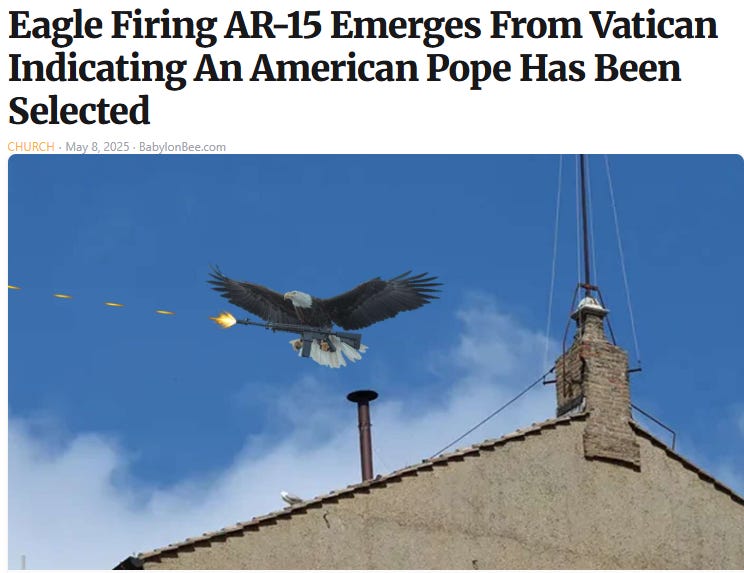
Now, I happen to think it’s good that we’re big, loud Catholics with main character energy and no manners (you know who else had manners? The Pharisees!), but we definitely are Like That and many others find it annoying. Pope Francis, in particular, often seemed to be particularly disdainful of Americans. It was always unlikely that a conclave would elect an American pope, but especially in the post-Francis conclave, stacked high with Francis-picked cardinals. Even Francis’s American cardinals do not distinguish themselves as enthusiasts for America.
Instead, I rather strongly suspect that the conclave saw then-Cardinal Prevost as a South American.
Yes, Pope Leo was born in the States and grew up here. He was shaped by our culture. Leo is almost certainly the first pope to have casually watched at least a few episodes of Star Trek, and there can be no question that he watched The Bob Newhart Show as a teen. He is a citizen. He votes in American elections.
However, what he’s known for as a cleric is almost all international work. Shortly before his ordination, Pope Leo was sent to Rome for further studies,15 then spent 13 years doing missionary work in Peru (interrupted by only brief stints in Chicago and Rome). He was recalled to Chicago for 2 years to supervise the Augustinian Order in the U.S. Midwest, but, in 2001, was elected Prior General of the Augustinian Order (twice!), which necessitated that he spend the next dozen years in Rome. Pope Francis then shipped him back to Peru, where he was ordained a bishop by a long-serving diplomat in the Vatican’s foreign office, with two Peruvian bishops co-consecrating. +Prevost spent the next nine years as bishop of Chiclayo, then was recalled to Rome in 2023 to head the Dicastery for Bishops. Add it all up, and Prevost has spent more than half his life in Peru and Rome, and nearly his entire post-ordination life. (I count 21 years in Peru, 17 in Rome, and just 3 in the U.S.A..) As previously mentioned, America thinks it’s the main character, so we just decided he was “The American Pope,” claimed him for our own, and Heaven help South American media if they tried to win a narrative fight with U.S. media. Fox News they ain’t, and have no idea what it takes to challenge the New York Times, so, yeah, now he’s “The American Pope.”
Yet I’ll bet most of the voters thought of him, at the time, as “Another South American Pope.”
Even if I am wrong about this, and the cardinals did see +Prevost as “Americano,” it’s still unlikely that they gave any serious thought to Donald Trump in the voting. Pope Leo could easily reign for 30 years. Trump will be gone forever in 3, would never listen to any pope anyway, and, quite frankly, isn’t that important in global Catholic politics. It is possible (but very unlikely) that Catholic Vice-President J.D. Vance will later become U.S. President,16 but he, too, seems likely to ignore inconvenient papal messaging… like most Catholic monarchs before him, from Henry IV to Joe Biden. +Prevost appears to have won the papacy entirely on his résumé and personal qualities.
The Leonine Enigma
Putting together all these details (many of which we shouldn’t even know) still tells us precious little about how Pope Leo XIV will govern as Pope.
My very first reaction when he stepped out on the loggia was a quizzical look. The non-Catholic quiz bowlers I was sitting with asked why I looked puzzled, and I said, “Huh! It’s just he was backed by the progressives, but Leo is a conservative name!” I wondered if I’d had the wrong read on him. The quiz bowlers, on the other hand, assumed it was a show of force, a wresting of the name Leo into progressive hands. Leo’s action could thus be read in two lights. So far, I’m not sure Pope Leo has done anything that can’t be read in (at least) two lights. We still know very little.
The man takes the office, but the office shapes the man. Indeed, the papal office shapes its holders more than most, since it is one of the world’s last absolute monarchies. Those who live in the monarchy are obliged to toe the party line, moreso than officials in democratic-republics (or face political exile, like Cardinal Burke), which means Cardinal Prevost had few opportunities to express any views of his that opposed Pope Francis. Those who then ascend to the monarchy face no internal checks and balances whatsoever. That will change anyone, even if we knew a lot about Pope Leo, which we don’t. It took me three or four years to draw my conclusions about Pope Francis;17 I expect it will take at least six months for me to get a bead on Pope Leo.
One thing we do know about Pope Leo is that he has made a special devotion to his priestly vow of obedience, subsuming his will more than most in the will of his superiors. Now, for the first time in his life, he has no one to obey except Catholicism’s silent God. Your guess is as good as mine. It might even be as good as his! Until late April, Robert Cardinal Prevost was just a backbencher, and a relatively new one at that, with approximately a 0.02% chance of being elected pope. His stock jumped considerably in that final week, but, by then, things were so frantic that it’s possible Pope Leo didn’t give a first thought to what he would do in office until he actually put on the big hat!
De Civitate has some suggestions, if Pope Leo is in the market! My next piece will lay out the program I would have followed if I had been (miraculously) elected.
However, as a loyal son of the Church, I will regard Pope Leo as I would regard any new pope. As my new Holy Father, I give him my respect, my attention, my filial piety, a measure of docility, and the benefit of the doubt. I owe him that, even knowing that he is, like any father, a flawed human being (perhaps even a very flawed one) prone to mistakes (perhaps even grave mistakes). I am cautiously optimistic. We should definitely pray for him.
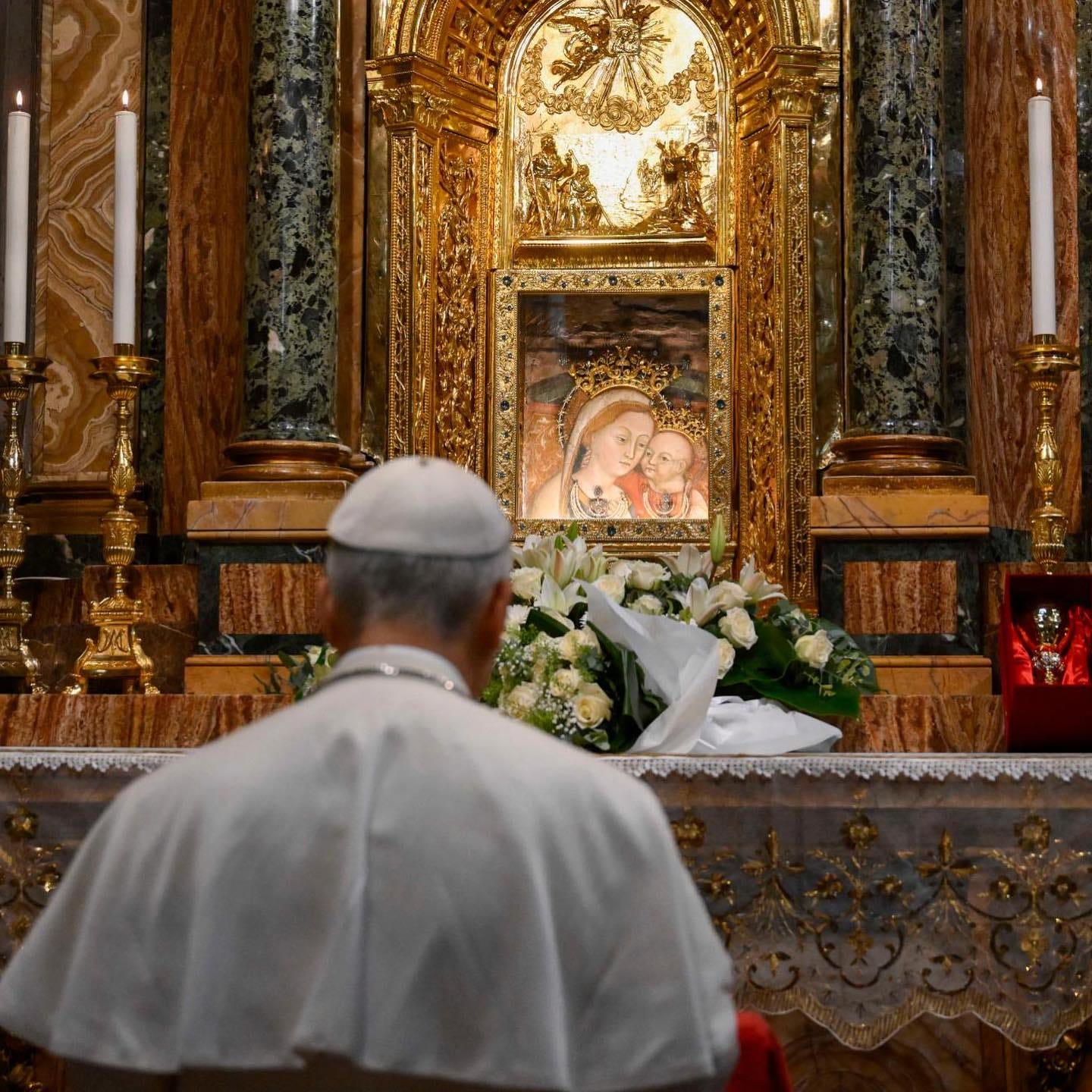
PROGRAMMING NOTE: As mentioned above, I’m working on an article about what I would do if they made me pope. However, that article will likely be my last bit of papal coverage for a while. The Minnesota legislature’s end-of-session is approaching, I have a short review and a Worthy Reads I’m eager to write, and I need to interview a guy about saving babies.
for very limited values of “all”
For example, in Canon #22 of the Second Lateran Council, and, more recently, in Veritatis Splendor and some associated commentaries by then-Cardinal Ratzinger’s Dicastery for the Doctrine of the Faith (which exists to answer such questions).
My own view of the Amoris Laetitia controversy is complex, not that you asked, but I’m going to tell you anyway here in this footnote.
The Church does teach that grave sin only cuts one off from the state of grace if full knowledge and full consent were also present. The Church furthermore teaches a pretty broad definition of what could constitute “compromised consent” and leaves room for individual sinners, pastors, and confessors to form their own conscientious judgment about whether a given sin was truly mortal.
Although this teaching is well-founded in Catholic tradition, and although it obviously applies to many kinds of sin, the current Catechism mentions it only once. This mention doesn’t come in the section about mortal sin or “full consent of the will” (CCC 1859), but in the section on—oddly enough—masturbation! (CCC 2352, second paragraph.)
It is easy enough to understand why the Catechism writers did this. Masturbation is an extremely perverse sexual sin, objectively a form of “the sin against nature.” Considered strictly in terms of perversion, masturbation is in the same category as sodomy or bestiality, and arguably worse than both. Masturbation is also exceedingly common, especially among adolescents, even if religious (see pp27-31 of Mark Regnerus’s Relationships in America study). The fact of the matter is that the average compulsive, hormone-drunk teen fapper who swiftly regrets and repents in her post-nut clarity has not damned her soul, and it does very little good (and a great deal of harm) for ~20% of young Catholic women and well over half of young Catholic men to walk around constantly thinking they’ll go to Hell if they die today simply because they can’t get to confession until the weekend. Thus, the Catechism gives this friendly reassurance: yes, masturbation is very serious, but you’re young, incredibly immature, horny beyond your capacity to manage, coping badly with mental stresses, and/or addicted, so make a sincere, heartfelt Act of Perfect Contrition, refrain from communion, go to confession in the reasonably near future, work with your confessor on tools to conquer this sin, and you’re gonna be okay (even if you die this instant).
It is obvious that there are many other habitual or compulsive sins where these reassurances might apply equally well, like drunkenness or bulimia-induced gluttony.
Pope Francis’s first bold innovation was to apply this model of individualized pastoral care to the situation of adulterously “remarried” couples who have not stopped having sex with each other. However, at least on its face, at least in the typical case, this seems like a rather different situation from an individual (especially an adolescent) grappling with compulsive sin, so how to apply this model to the adultery situation is, at least, not obvious.
Francis’s second bold innovation was to suggest that, since only mortal sin bars one from the Eucharist, and since no mortal sin can been committed where full consent of the will is compromised, pastors should sometimes allow couples that have recently committed adultery to receive the Eucharist before going to confession. This is doctrinally plausible, but in the profoundest tension with Catholicism’s millennia-old attitude that, in doubtful cases, one should err on the side of not receiving the Body and Blood of Christ (lest one “eat and drink judgment upon oneself”).
Still, there’s nothing in Amoris Laetitia itself that contradicts the Faith, and it is not difficult to imagine situations where this sort of approach would be appropriate. It’s vague enough to invite interpretations that do contradict the Faith, but those could have been corrected easily enough with a few gentle clarifications from the Holy Office, which were quite common under John Paul II and Benedict XVI.
The real crisis of Amoris Laetitia emerged when Francis studiously, pointedly refused to issue any such clarification and publicly endorsed implementations of Amoris Laetita that, while not strictly heretical, were plainly wide open for abuse. It did not help that the Church’s progressive faction was about as clear as could be that they viewed Amoris Laetitia as a beachhead, that they intended to abuse it to offer blanket admission to the Eucharist to adulterously remarried Catholics, and that they hoped to eventually expand Amoris to destroy the Church’s entire “deductive, absolutist, one-size-fits-all” sexual morality (necessarily taking down the Church’s Eucharistic theology and its infallible magisterium as collateral damage).
Francis’s obviously deliberate tolerance of these abuses challenged a lot of orthodox Catholics’ understanding of the Holy Spirit’s protections for the papacy and of Church’s entire teaching authority. I saw a lot of crises of faith here in the trenches, not all of which ended with the subject remaining in the Church. None of this was beneficial, nor was it necessary.
My own view is that the first two paragraphs of Humanae Vitae Section #14 are ex cathedra teachings, and are therefore infallible and irreformable. This view is uncommon, but correct. Once you discard the obviously false (but very common) belief that there have only ever been three ex cathedra definitions, and instead start to grapple with what Vatican I really said and how the papacy has issued definitions historically, it becomes much clearer. More on this in a few years, when my infallibility project is finished.
I set the over/under on this at 150 years. Even odds that Catholic sexual teaching is once again accepted as obvious and normative by 2175. Of course, people won’t obey the Church’s sexual teachings, because they never have, but the inevitable fornicators and pornographers will generally realize—as they once did—they are doing something wrong.
There’s also “synodality,” but, since nobody actually has any idea what “synodality” means, not its critics, nor its supporters, Pope Leo’s inane comments favoring it tell us nothing except that he’s a team player. Most synodality arguments right now are just disguised if-by-whiskey arguments, and that’s not the fault of its critics.
The College of Cardinals Report also mentions ordination of women to the diaconate, but this has been essentially a dead issue in the Church since Francis ordered the issue studied, concluded it did not have theological legs, and repeatedly pooh-poohed it in public. If you’ve lost Pope Francis on an issue like this, you’ve just lost.
Many people outside Catholicism also want to know what Pope Leo thinks about gender identity, but, again, Pope Francis’s opposition to what he called “gender ideology” and skeptical treatment of sex change in the Holy Office’s 2024 document Dignitas Infinita (#55-60) left these questions with little purchase at the highest levels of the Church, such that College of Cardinals Report didn’t include it at all. It can be safely assumed that Pope Leo concurs with the text of Dignitas Infinita.
…for certain restricted senses of “everyone,” viz. Overly Online Catholics.
I have attended one TLM in my life, and the experience only made me grateful for the modern Mass of Paul VI. I am no Vetus Ordo partisan. I agree with many liturgical criticisms of both masses.
However, I don’t see why a Church with immense liturgical diversity needs to throttle the life out of an ancient, widely beloved, and entirely orthodox form of liturgical expression. Combined with Rome’s studious indifference toward actual heretics pressing sterile liturgical and doctrinal revisions, I, an innocent bystander, came to see Pope Francis’s attempt to crush the TLM as not merely myopic, but vindictive. “Accompaniment” of the “peripheries” always seemed to go out the window when Pope Francis encountered a periphery that he personally disliked.
As I explained in a recent article, cardinals who violate the oath of secrecy commit grave sin, but are not excommunicated latae sententiae. Support staff who violate the oath are excommunicated “automatically.” No one who hears from the oathbreakers is bound by the oathbreakers’ broken oath, so there is no sin in us talking about it, although directly discussing the conclave with them (as journalists do) raises the specter of cooperation with evil.
This is an obvious scandal that makes it impossible to believe the princes of the Church about anything. If they can swear on globally-broadcast television in God’s name on a Gospel to keep the conclave proceedings a total secret, and then leak the way they have leaked, do you really think they aren’t capable of quietly sweeping a rapey bishop under the rug, no matter what canon law says? Many faithful are confused and upset that we know so much about the conclave, especially that it’s clearly coming from the cardinals, and they are right to be.
Nevertheless, we know this stuff now, so I’m going to put it in my article.
Further American bishop goss:
It is widely assumed that +Prevost’s star rose so far over the past couple of years because progressive Cardinal Blaise Cupich, Pope Francis’s favorite American bishop and the cardinal of Chicago, lobbied for his fellow Chicagoan, +Prevost, to be put in charge of the Vatican’s dicastery for selecting bishops, arguably the third- or fourth-most powerful position in the Church. (I have heard +Prevost called “Cupich’s man in the Vatican.”) Thus, he was viewed as a progressive.
At the same time, there are disputed reports that +Prevost met privately before the conclave with Cardinal Leo Burke, a conservative bishop whom Pope Francis loathed (and effectively exiled), possibly with other cardinals, at +Burke’s apartment, and there secured +Burke’s support. Not in the quid pro quo bribery sense, of course, but in the okay-I’m-reassured-you’d-do-a-good-job sense, like how Supreme Court nominees meet privately with members of the Judiciary Committee before their public hearings.
Francis topped 75% when he was elected on the fifth ballot.
Benedict XVI had over 70% when he won on the fourth ballot.
John Paul II was elected on the eighth ballot, but with over 90% of the vote.
John Paul I also topped 90% of the vote on just four ballots.
Wikipedia doesn’t have even an approximate vote count for Paul VI, but it appears to have been the last election where a faction attempted (unsuccessfully) to block a specific candidate, surviving only five ballots.
John XXIII, elected in 1958, took eleven ballots to secure 75% of the vote.
My point in noting this is that Pope Leo’s election in four ballots with 75% of the vote is by no means unusual. It should not be interpreted, as some have interpreted it, as a sign of unity or obvious consensus. All the typical political dynamics of the conclave appear to have played out as they usually do, with factions rapidly identifying strengths and weaknesses and converging on a consensus. (Because they always rush the process and aren’t actually great at communication, the consensus is sometimes just a Schelling point, not the Condorcet winner, but it gets the job done. A long conclave—like two weeks—would probably be good for the Church.)
There will not be an argument. There just should be. What will actually happen is the press will decide +Prevost was not papabile because the story’s more dramatic that way, and the press loves drama.
…and probably Crux, to be fair, but I’m not a regular of theirs.
This is common practice for a diocese’s “best and brightest.” Fr. Bob was sent, specifically, to the Pontifical University of St. Thomas Aquinas, aka the Angelicum, aka “The Anj,” aka the best Catholic school in Rome, and I’m not just saying that because I spent a semester in undergrad in an excellent study abroad program at The Anj. (A young Pope John Paul II also studied at the Angelicum, and he turned out okay.)
Pope Leo was there in the ‘80s, when everything was worse, but, still, better than studying at the Greg! :-P
Assume a 50% chance that the vice-president of an outgoing president wins his party primary. Then, assume a 50% chance that he wins in the fall. Vance would then have only a 25% chance at winning the presidency.
The true odds are much lower than that, because President Trump is unpopular, seems likely to remain unpopular and perhaps become even more unpopular (because he is a lame duck, because that is what his approval ratings did last time, and because voters hate his tariffs), and unpopularity for Trump makes it harder for Vance to win both the primary and the presidency. There’s like a 15% chance he’s actually our next president, and a lot of that depends on Trump turning things around.
Pope Francis may well have been a good man. I didn’t know him personally, and none but God knows his heart. Certainly, Pope Francis’s conspicuous acts of charity and humility set a great example for the world, and he was beloved by many—far more than Pope Benedict before him.
However, Pope Francis was a bad pope. The pope is not a figurehead like King Charles, whose only function is to set a great example. The papacy is an actual job, with very human managerial responsibilities, and Pope Francis was bad at that job.
The curia is the Roman bureaucracy that governs the Vatican city-state, the Latin Rite of the Catholic Church, and (to a much lesser extent) the Eastern Catholic Churches as well. The curia is very corrupt. Benedict resigned because he was overwhelmed by corruption in the curia. Francis was elected largely to deal with corruption in the curia, but Leo is now pope and he is faced with crisis levels of corruption in the curia. This is one of a number of ways in which Pope Francis, while remaining globally beloved, performed poorly in his actual day-to-day job functions.
This does not imply anything about Pope Francis’s heart. St. Celestine V was a gawdawful pope and everybody knows it, but we canonized him a saint because he was a great human!


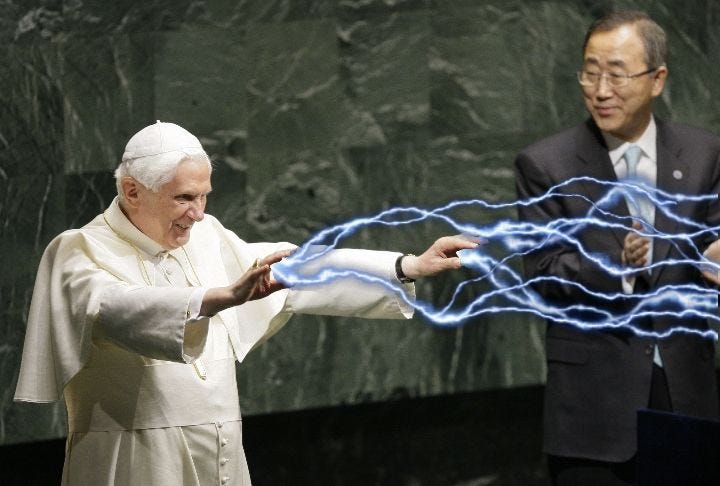
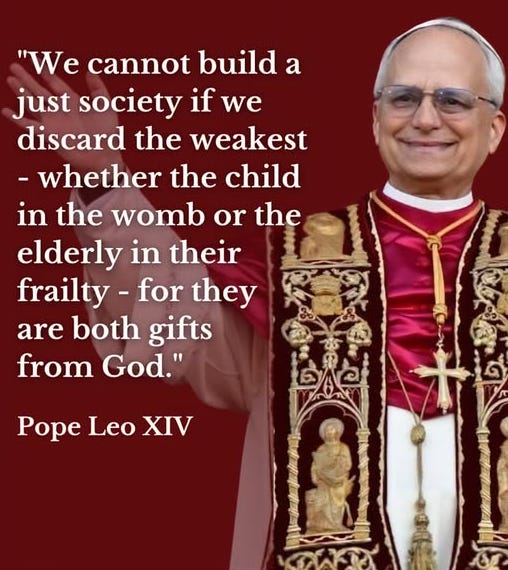


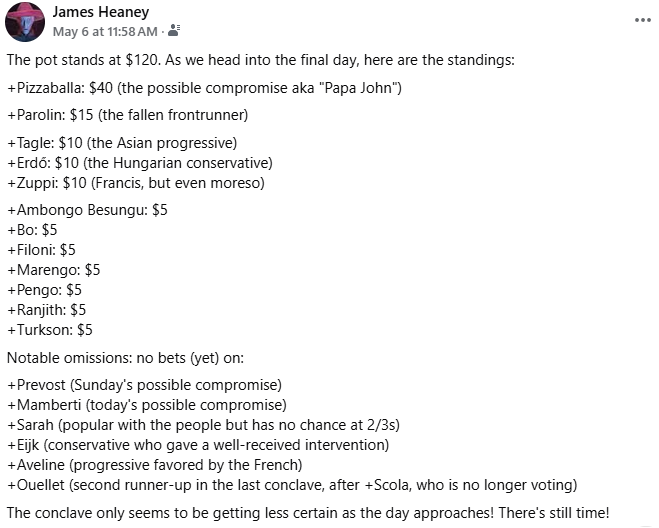

"If you were reading The Pillar, you weren’t surprised by this outcome."
I beg to differ. I read The Pillar, I had heard Cardinal Prevost mentioned as papabile, but I was still surprised to hear the newly elected Pope was American. (My exact reaction: "Holy cow!")
"Once you discard the obviously false (but very common) belief that there have only ever been three ex cathedra definitions,"
I don't think I've ever seen someone say there were three. I've certainly seen people say there were two--the Immaculate Conception of Mary and the Assumption of Mary--but I don't think I've ever seen someone say three before. I assume two of the three were the ones I stated, but what is the third one you had in mind?